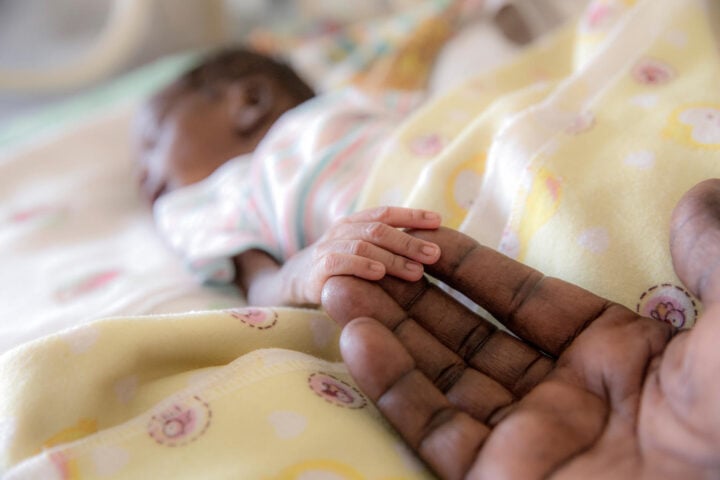Newborn infant boy Ayah, whose mother bled to death following his delivery and who suffers from jaundice and sepsis and weighs only 1.3 kilograms, has his hand held by his grandmother Await Said as he lies in an incubator at the Juba Teaching Hospital, Juba, South Sudan, Monday 29 January 2018. The hospital does not have the equipment to properly test and treat Ayah. According to the paediatrician on the ward, "if a baby needs anything more than basic treatment then there is nothing we can do. We are doing our absolute best but some things are simply out of our control”. More than 10% of infants that are born at the hospital's neonatal clinic die. South Sudan has some of the highest maternal and infant mortality rates in the world with one in 26 infants dying within 28 days of birth.
BY AISHAT ABIOLA
Maternal and child health are critical indicators of a nation’s well-being, as they reflect the government’s commitment to the welfare of its citizens. High maternal mortality rates, inadequate prenatal care, and persistently high rates of child mortality are serious issues that need urgent attention.
Nigeria, the most populous country in Africa, has been grappling with significant challenges in ensuring the well-being of mothers and children. One of the most pressing concerns in Nigeria is high maternal mortality rates.
According to the World Health Organisation (WHO), Nigeria’s maternal mortality rate was estimated at 917 per 100,000 live births in 2017, and it increased by nearly 14% in 2020 to reach 1047 deaths. This places Nigeria among the countries with the highest global maternal mortality rates.
Advertisement
Factors that have contributed to this grim reality include limited access to quality healthcare services, especially in rural areas, where a significant portion of the population resides.
Inadequate prenatal care has also been aggravating the challenges faced by expectant mothers in Nigeria. Many women lack access to essential prenatal services which leads to complications during pregnancy and childbirth.
Again, the late initiation of antenatal care, coupled with a shortage of skilled healthcare professionals, contributes to preventable maternal deaths. Insufficient resources, infrastructure, and education on the importance of early and regular prenatal check-ups further compound the problem.
Advertisement
It is apt to assert that maternal and child health are intricately linked, and the challenges faced by mothers will also directly affect the well-being of their children. High maternal mortality rates contribute to increased rates of infant mortality.
Children who are born to mothers who have faced complications during pregnancy or childbirth are more vulnerable to health issues and developmental delays. Adequate maternal care is essential for ensuring a healthy start in life for infants and reducing the risk of long-term health challenges.
Another key contributor to maternal and child health challenges in Nigeria is inadequate access to healthcare services. Rural areas, where a significant portion of the population resides, often lack the proper healthcare infrastructure.
Limited healthcare facilities, a shortage of skilled healthcare professionals, and inadequate transportation make it difficult for pregnant women to access timely and quality medical care. Addressing this issue will require significant investments in healthcare infrastructure as well as efforts to improve healthcare delivery in remote areas.
Advertisement
In the same vein, cultural practices and beliefs also play a large role in shaping maternal and child health outcomes in Nigeria. Traditional beliefs can hinder women from seeking timely medical care during pregnancy as they rely on traditional birth attendants or home deliveries.
Cultural norms around family planning and fertility may contribute to high-risk pregnancies and larger family sizes, further straining maternal health. Addressing these cultural barriers requires sensitization campaigns that promote the importance of modern healthcare practices while respecting cultural diversity.
Let me also add that education plays a crucial role in addressing maternal and child health challenges in Nigeria. Lack of education, particularly among women, contributes to poor health-seeking behaviours, late initiation of prenatal care, and a limited understanding of family planning.
Investing in education, especially for girls and women, will empower them to make informed decisions about their health, family planning, and the well-being of their children. This can also help in reducing child mortality rates by fostering an awareness of essential health practices.
Advertisement
It is imperative that Nigeria needs to implement a comprehensive and integrated approach to tackle the persistent challenges plaguing maternal and child health. Government agencies, healthcare professionals, non-governmental organizations, and local communities must collaborate to execute effective policy interventions.
These interventions should include:
Advertisement
Improved healthcare infrastructure: Investment in healthcare infrastructure, especially in rural areas, is crucial. Building more healthcare facilities, ensuring that there is a sufficient number of skilled healthcare professionals, and providing adequate resources can enhance accessibility to maternal and child health services.
Community engagement: Engaging with local communities is essential for changing health-seeking behaviours. Community leaders, traditional birth attendants, and religious leaders can play a pivotal role in raising awareness about the importance of prenatal care and safe delivery practices.
Advertisement
Education programmes: Implementing educational programmes that focus on maternal and child health, family planning, and hygiene is vital. These programmes should be tailored towards the specific needs and cultural contexts of different communities and encourage informed decision-making.
Government commitment: Government commitment to allocating resources and implementing policies that prioritize maternal and child health is paramount. This includes ensuring that healthcare services are accessible, affordable, and of high quality across the country.
Advertisement
Last line
Maternal and child health in Nigeria faces multifaceted challenges that demand a comprehensive and collaborative approach. To address the high maternal and child mortality rates, efforts should be focused on improving healthcare access, overcoming cultural barriers, and promoting education.
Sustainable solutions require the active involvement of government agencies, healthcare professionals, NGOs, and local communities. By addressing these challenges head-on, Nigeria can pave the way for a healthier future, ensuring the well-being of mothers and children across the nation.
Aishat M. Abisola is an NYSC member serving with PRNigeria Centre Abuja.
Views expressed by contributors are strictly personal and not of TheCable.
Add a comment






